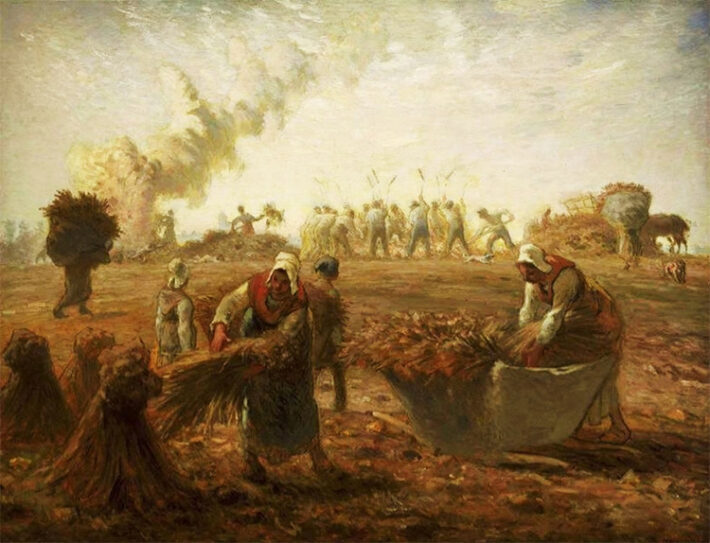Christian Art | Christians And The Devil | Parables Of Jesus
Matthew 13: 24-30 – Week 16 Ordinary Time, Saturday (King James Audio Bible KJV, King James Version Spoken Word)
24 ¶ Another parable put he forth unto them, saying, The kingdom of heaven is likened unto a man which sowed good seed in his field:
25 But while men slept, his enemy came and sowed tares among the wheat, and went his way.
26 But when the blade was sprung up, and brought forth fruit, then appeared the tares also.
27 So the servants of the householder came and said unto him, Sir, didst not thou sow good seed in thy field? from whence then hath it tares?
28 He said unto them, An enemy hath done this. The servants said unto him, Wilt thou then that we go and gather them up?
29 But he said, Nay; lest while ye gather up the tares, ye root up also the wheat with them.
30 Let both grow together until the harvest: and in the time of harvest I will say to the reapers, Gather ye together first the tares, and bind them in bundles to burn them: but gather the wheat into my barn.
See also: Jesus Explains The Parable Of The Weeds | King James Audio Bible KJV
The householder has sown good seed in his field. It is the enemy who has come to corrupt the crop, sowing weeds among the wheat. The weed, cockle, would look very like wheat and could easily be mistaken for wheat until the ears appeared. If ground with the wheat, the flour would be contaminated and the bread nauseas to eat. In the East, personal vengeance might take the form of sowing cockle among an enemy’s wheat.
We are asked by Jesus to think of our good qualities and of our sins – of the purity of our own lives and of our communities. Jesus glances in the parable at the requirement for ritual purity which was a part of the custom and law of the Jews, and may seem to suggest a more mixed community, in which the weeds and the good wheat are mingled, until the time of harvest. Such is the way of our world, whereby people are not segregated, and too in which, within each of our lives, there will be good deeds and some less than good.
In the parable, we are not called upon by Jesus prematurely to cleanse our communities of people we may see as giving themselves over to evil. Such judgements we might make could be rash and inadvertently destroy that which is good. We might be doing the Devil’s work for him. Rather we think of the wheat as we focus upon cultivating the good within ourselves, and being alert to our own sins. We may be confident that, at the time of harvest, the good will be apparent and the evil also. We are asked to pay heed to the health of our own souls, to be sons of the Kingdom, and not sons of the evil one.
‘The situation is clear: the field is fertile and the seed is good; the Lord of the field has scattered the seed at the right moment and with great skill. He even has watchmen to make sure that the field is protected. If, afterwards, there are weeds among the wheat, it is because men have failed to respond, because they – and Christians in particular – have fallen asleep and allowed the enemy to approach.
‘When the careless servants ask the Lord why weeds have grown in his field, the explanation is obvious: ‘inimicus homo hoc fecit: an enemy has done this.’ We Christians should have been on guard to make sure that the good things placed in this world by the Creator were developed in the service of truth and good. But we have fallen asleep – a sad thing, that sluggishness of our heart while the enemy and all those who serve him worked incessantly. You can see how the weeds have grown abundantly everywhere.’ St Josemaria Escriva.
Concluding Prayer
Give us perfect peace, Lord,
so that we may delight in serving you
all the days of our life,
and at the last, with our Lady’s help,
come safely to your presence.
Through Christ our Lord.

![]()
King James Audio Bible | Endnotes
Reality Of Satan – The Devil
The Parable of the Weeds, taught by Jesus in Matthew 13:24-30, is a powerful reminder of the reality of Satan – the Devil – of the influence of Satan in the world and his temptations. In the parable, a man sows good seed in his field, but while he is asleep, an enemy comes and sows weeds among the wheat. When the wheat and weeds grow up together, the servants ask the owner if they should pull up the weeds, but the owner says to let both grow together until the harvest. Then, at the harvest, angels will separate the wheat from the weeds and burn the weeds in the fire.
This parable is metaphor for influence of Satan in the world his attempts to lead people away from God. As the enemy sows weeds among the wheat, Satan uses his influence to lead people from God and towards sin and death. In short, Satan in his malice wants to kill us.
The wheat in the parable represents those who are faithful to God and seek a life pleasing to Him, while the weeds represent those who have been deceived by Satan and have turned away from God.
The parable signifies hope and grace that is available to us through Jesus. As the owner of the field allows both the wheat and the weeds to grow together until the harvest, God allows both the righteous and the wicked to live in the world until judgement. At the harvest, weeds will be burned in the fire – separation of the righteous from the wicked.
Christians are called to resist the influence of Satan and to remain steadfast in their faith in Jesus. Through the grace and strength given to them through Jesus, Christians are empowered to resist Satan’s temptations and to live a life that is pleasing to God.
Through faith in Jesus and living in obedience to His will, Christians dare hope with confidence for salvation from sin and the hope of eternal life in heaven, breaking free from the influence of Satan and living a life that brings glory to God.







